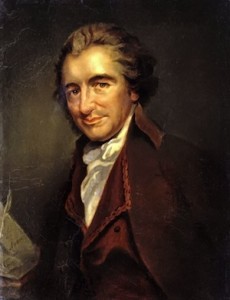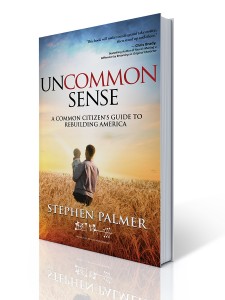 Thomas Paine’s book, Common Sense, altered the course of history.
Thomas Paine’s book, Common Sense, altered the course of history.
Without it (and the impact it had on the American Revolution), it is doubtful that America would have won.
At the beginning of the war, John Adams suggested that about a third of Americans supported Independence, about a third supported Britain, and about a third were undecided. He thought that only great leadership would swing the middle third to the side of freedom.
Three things provided this leadership:
- George Washington’s strength as the commander
- Jefferson’s words in the Declaration of Independence
- Thomas Paine’s essay on Common Sense
Of the three, Paine’s impact came first, and without it the other two might never have had a chance.
Paine was self-educated, from the working class, and failed in a long string of attempted businesses and careers.
His main problem seems to be that he couldn’t pull himself away from reading long enough to succeed in commerce or a job.
During all his failures, as historian Page Smith put it:
“…he had read history and political theory with the avidity of a starving man.
“Things had seemed desperately wrong to him in England, and he had searched the books to try to find out why, and what might be done to change things for the better. He could not believe that God had intended that the rich should grind down the poor…”
At age thirty-seven Paine left England to try out the New World, and he found a nation where the common man was still considered important.
He found in the Americans a society that would listen to his message, the answer he had found for how to improve the world. His timing couldn’t have been better.
Paine’s solution, pure “common sense” in his view, was that God did not intend some men to be masters and others to be their subjects. He meant for everyone to have equal freedoms and opportunities, and any law or government to the contrary was evil.
As Algernon Sydney, who was widely read and quoted across the American colonies, wrote:
“That which is not just is not law; and that which is not law ought not to be obeyed…”
Indeed, Sydney and Paine argued, the higher law of morality and justice must be followed by all true nations, people, and governments as well.
This set the stage for the Declaration of Independence, and it energized Washington’s army. The one-third in the middle dwindled as many joined the colonial cause.
Page Smith wrote:
“To say that it was the most successful political pamphlet in history is to do it insufficient credit. Common Sense belongs in a category all its own.”
Washington said that “Common Sense is working a powerful change in the minds of men,” and, according to Smith, after he read it he “stopped toasting the King at official meals.”
It is interesting that when Paine wrote Common Sense his name wasn’t known in the colonies, and in fact it wasn’t even published on the cover.
We never know where the next great idea might come from.
I’m writing this because I believe that some of the Thomas Paines of our day are out there.
The modern world teaches that a person must make a name, gain credibility, and only then share important ideas. History proves differently.
If you have a mission to spread freedom, don’t wait for the experts or anyone else to give you permission. Freedom is part of all of us, deep down where things matter most. If you have a voice to share for freedom, get to work getting your message out.
 The way to change the world is to start.
The way to change the world is to start.
Another such book, one that I believe can change the world today, is Uncommon Sense by Stephen Palmer. It is one of the best books of our age! Whatever else you do, absolutely read it! And share your voice for freedom as well.
The world needs more voices for freedom. Today more than ever.
(See A New Age Now Begins by Page Smith for many of these ideas and quotes. Also, don’t miss out on reading Common Sense in its original, as well as Uncommon Sense. They are both classics for our time.)






Thomas Paine’s contributions to the struggle for liberty go far beyond his writing of ‘Common Sense’. His pamphlet, ‘Agrarian Justice’ is one of the most far-reaching statements on social policy ever written. Our members are working to re-introduce Paine’s insights and principles to the world desperately in need of common sense values.
Edward J. Dodson, President
Thomas Paine Friends